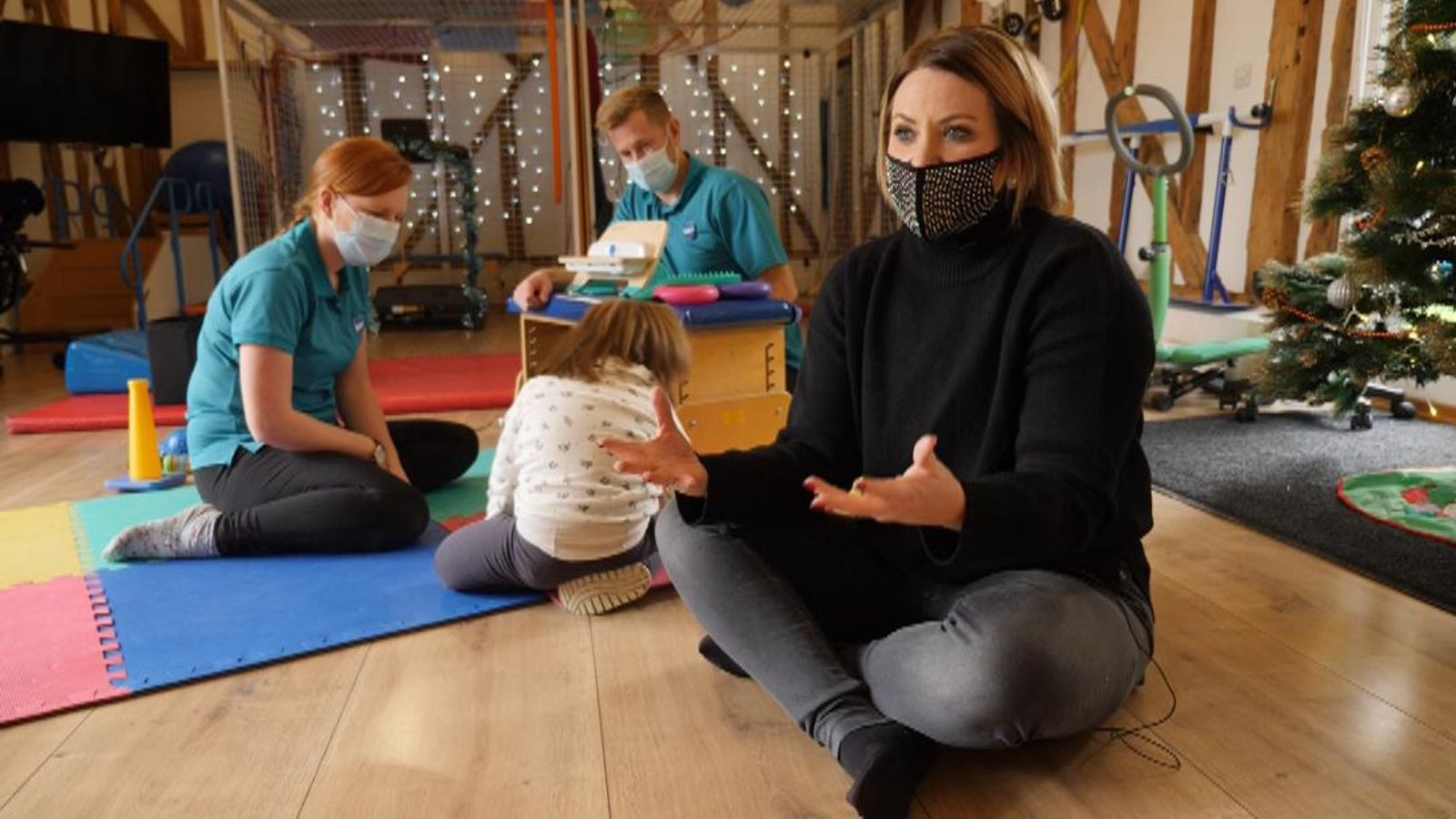According to her mum, Daisy is the “happiest little girl you’ll ever meet”. It certainly seems that way at her physiotherapy session, where the four-year-old is laughing, dancing, singing and playing musical instruments.
But her mum, Corina Gander, also says her daughter is frequently written off, due to a general lack of understanding around Down Syndrome.
“Sometimes as a parent you kind of feel that no one has any high expectations for our children,” she told Sky News. “It’s that old-fashioned stigma.”
Corina was told Daisy would have Down’s syndrome while she was pregnant. The care she received before birth was “fantastic”, but she says there was a dramatic shift once Daisy arrived, to the point where concerns over her daughter’s breathing were repeatedly dismissed.
“I was always told ‘well, she’s got Down Syndrome, what do you expect?’,” she said.
Corina, who has four other daughters aged between eight and 20, knew something wasn’t right with her baby.
“My other kids aren’t doing this, so should I be more concerned about her? ‘No no, you’ve just got to accept you’ve got a sick child’. I remember someone saying that to me. Well yes, she was sick but having Down Syndrome doesn’t make her sick.”
New COVID variant: UK urgently brings in travel restrictions to stop spread of ‘the worst one we’ve seen so far’
COVID-19: Wise to take precautions against nasty new variant B.1.1.529
COVID-19: What we know so far about B.1.1.529 variant that may make vaccines ‘less effective’
Daisy was eventually admitted to hospital three months later after contracting a virus. It transpired her lungs and other organs were “floppy”, resulting in severe breathing difficulties that saw Daisy put on life support.
“For three months, she was potentially really struggling but no one listened to me and there is nowhere for you to go,” Corina said.
The new Down Syndrome Bill, which is expected to clear its first Commons hurdle on Friday when it is debated at second reading, is designed to put an end to experiences like Corina’s and Daisy’s by making it a legal requirement for people with Down Syndrome to have their social care needs met.
The proposed legislation would see people with Down Syndrome legally recognised as a specific minority group, rather than treated more broadly as disabled.
Conservative former cabinet minister Dr Liam Fox, who introduced the bill, told Sky News: “It will give [people with Down Syndrome] a right to challenge local authorities, health authorities, educational authorities, if they’re not providing care.
“It will give them the right to challenge, in law.”
Guidance would be issued to the relevant authorities on the steps they need to take in order to meet the needs of people with Down Syndrome, according to the proposed law.
“This is the first generation that will outlive their parents because of life expectancy,” Dr Fox said.
“So there is an urgency with dealing particularly with this element of assisted care to make sure that those who do live longer than their parents are dealt with, with proper dignity and independence.”
Health minister Gillian Keegan, offering the government’s backing, said: “The health, care and happiness of people with Down’s Syndrome is an absolute priority for me.
“As both a minister and proud aunt to my much-loved nephew who lives with the condition, I am pleased to support this bill which will make a significant difference to ensuring health, education, social care and housing needs are met following a pandemic which highlighted disparities that need to be tackled.
“Dr Liam Fox’s bill and the following guidance will make it clear how the needs of people with Down Syndrome should be met.”
Back at home in Broxbourne, Hertfordshire, Daisy is playing with two of her older sisters, Angel, 10, and Rhianna, 20, who double as carers.
“I usually get [Daisy] dressed in the morning and give her milk at night,” Angel told Sky News.
Their support of Daisy is unlimited and unconditional, but there is no doubt that families like hers are in need of support too.
“Hopefully [the bill] will stop the challenges we face,” Corina said.
“We’re always fighting for things and it’ll make a massive difference to me as a parent.
“When you see that you feel [Daisy] is going to have a future.”






















